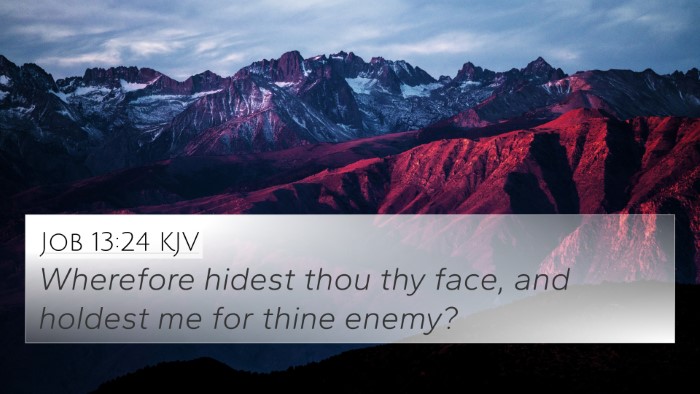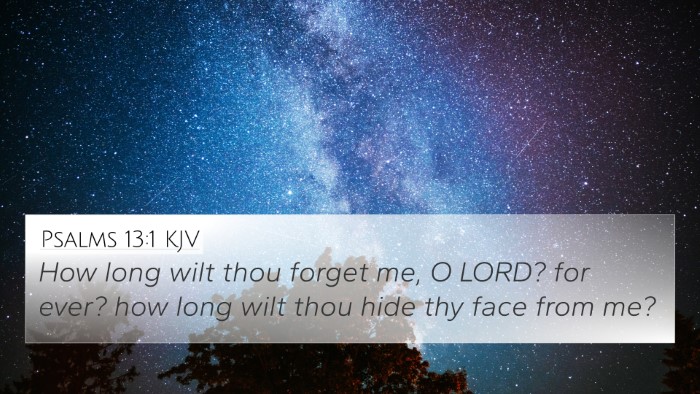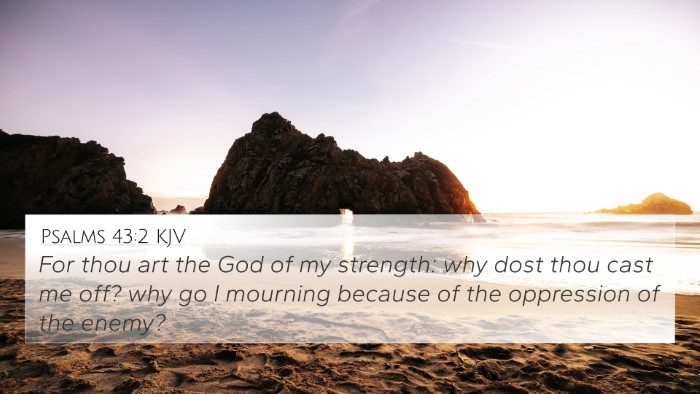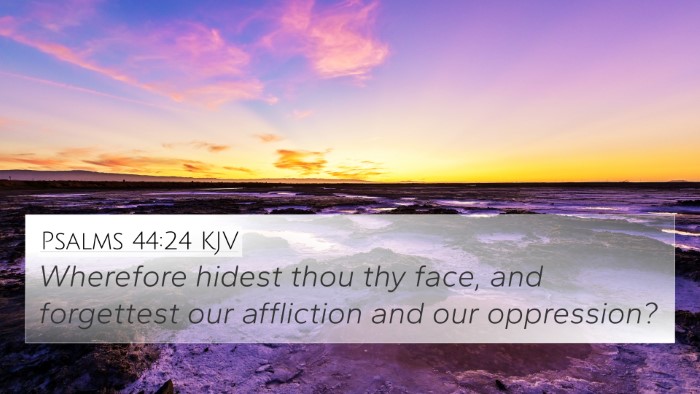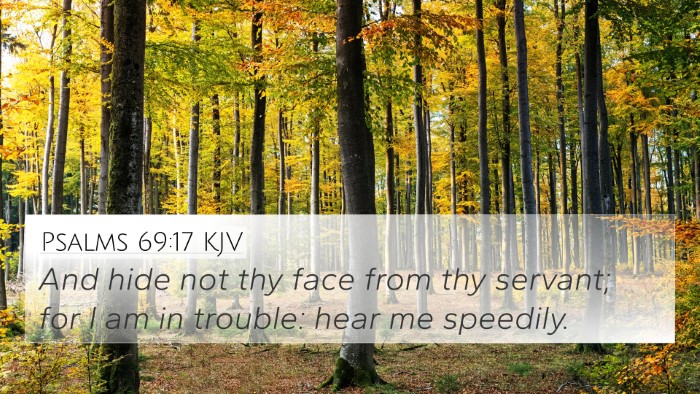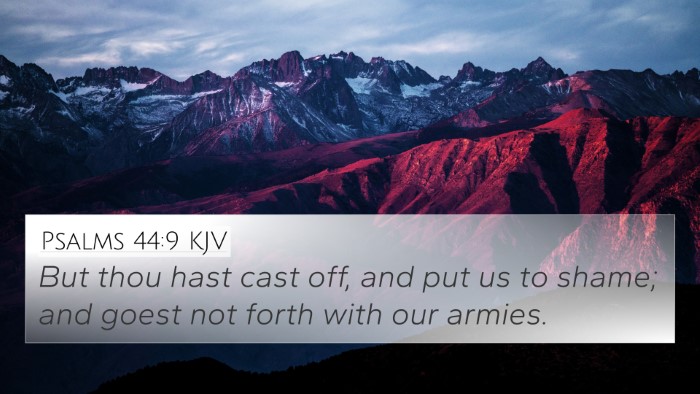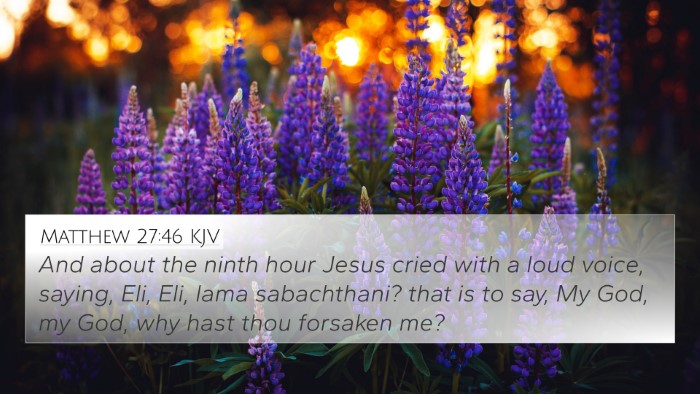Psalms 88:14 Interpretation
Verse: "O LORD, why castest thou off my soul? why hidest thou thy face from me?" (Psalms 88:14)
This verse, situated within the context of a deeply emotional Psalm, portrays the dire plea of the psalmist who feels abandoned by God. It reflects a state of spiritual desolation and isolation, resonating with anyone who has experienced a sense of separation from divine presence.
Verse Meaning and Summary
The meaning of Psalms 88:14 can be derived from several public domain commentaries:
- Matthew Henry: Henry emphasizes the psalmist's deep anguish and sense of divine distance. He notes that this cry to God reflects the despair of those who feel forsaken, questioning why God appears to abandon them in their time of need.
- Albert Barnes: Barnes argues that this verse encapsulates a feeling of rejection and the longing for God's presence in affliction. He highlights how the psalmist grapples with divine silence which exacerbates the pain experienced.
- Adam Clarke: Clarke remarks on the intensity of the psalmist’s emotions, noting that his questions demonstrate both a craving for God’s attention and a profound crisis of faith. Clarke interprets this wrestling with God as reflective of a deep desire for connection.
Key Themes in Psalms 88:14
The primary themes within this verse can be categorized as follows:
- Spiritual Despair: The feeling of being cast off or abandoned can resonate with any individual enduring grief or hardship.
- Longing for Divine Presence: The query about God’s face being hidden speaks to the universal human desire for divine reassurance amid suffering.
- Questioning Faith: The rhetorical questioning indicates a struggle with belief, serving as a poignant reminder of the complexities of faith during trials.
Bible Verse Cross-References
Understanding Psalms 88:14 can be enriched by cross-referencing with other scriptures:
- Psalms 22:1: "My God, my God, why hast thou forsaken me?" - Reflects a similar cry of abandonment.
- Psalms 30:7: "Lord, by thy favor thou hast made my mountain to stand strong: thou didst hide thy face, and I was troubled." - Speaks to the experience of God’s absence causing distress.
- Lamentations 3:8: "Also when I cry and shout, he shutteth out my prayer." - Highlights feelings of helplessness and divine silence.
- Job 13:24: "Wherefore hidest thou thy face, and holdest me for thine enemy?" - Expresses similar themes of perceived divine withdrawal.
- Isaiah 54:8: "In a little wrath I hid my face from thee for a moment; but with everlasting kindness will I have mercy on thee." - Discusses temporary divine hiding contrasted with eventual mercy.
- Matthew 27:46: "And about the ninth hour Jesus cried with a loud voice, saying, Eli, Eli, lama sabachthani?" - Connects with the theme of feeling forsaken in deep distress.
- 2 Corinthians 5:7: "For we walk by faith, not by sight." - A reminder of sustaining faith amid feelings of abandonment.
Connections between Bible Verses
By exploring connections among Bible verses, one can gain a comprehensive view of the themes surrounding abandonment and longing for divine presence:
- Connecting the Old and New Testaments: Comparisons between lament in Psalms and the expressions of desolation in the Gospels showcase continuity in human experiences of faith.
- Thematic Analysis: This verse can be paired with others expressing sorrow and a plea for God’s mercy, contributing to a larger understanding of suffering and hope.
- Cross-Referencing Tools: Utilizing a Bible concordance or cross-reference guide can aid in identifying these inter-Biblical dialogues more extensively.
How to Use Bible Cross-References
To effectively employ cross-referencing in Bible study, consider the following methods:
- Identifying Themes: Look for themes common across verses to deepen understanding and relativity.
- Comparative Studies: Analyze the context and teachings of parallel verses for insights.
- Building Context: Use cross-references to form a narrative or cohesive understanding around a given topic.
Conclusion
The cry of Psalms 88:14 is one that resonates with many today, addressing themes of isolation and the longing for God's presence. By cross-referencing relevant scriptures, one can uncover a wealth of understanding surrounding this poignant expression of faith and despair.



